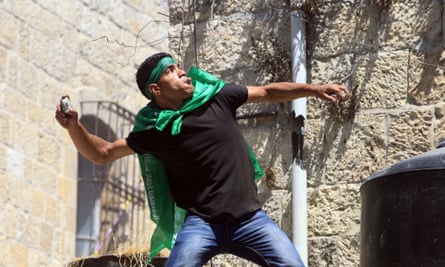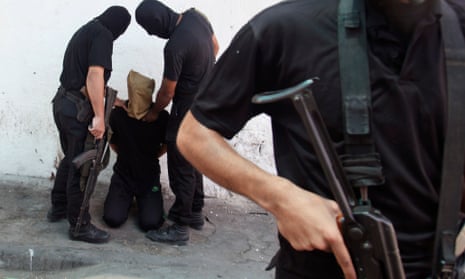Hamas has been accused of using the cover of last summer’s war in Gaza to carry out summary executions, including to “settle scores” against opponents under the pretext they were “collaborators with Israel”.
The claims that Hamas committed rights abuses amounting to war crimes are made in a damning report by Amnesty International highlighting abuses committed by Hamas during last summer’s 50-day war.
It includes accusations that Hamas carried out the summary execution of at least 23 Palestinians and the arrest and torture of dozens of others, including members and supporters of Hamas’s political rivals, Fatah.
Although Hamas described many of the summary executions as retribution against collaborators, according to Amnesty’s research some 16 were already in prison either serving sentences or in the midst of ongoing legal processes at the time the conflict broke out.
The group’s Middle East and North Africa director, Philip Luther, said: “It is absolutely appalling that, while Israeli forces were inflicting massive death and destruction upon the people in Gaza, Hamas forces took the opportunity to ruthlessly settle scores, carrying out a series of unlawful killings and other grave abuses.
“In the chaos of the conflict, the de facto Hamas administration granted its security forces free rein to carry out horrific abuses, including against people in its custody. These spine-chilling actions, some of which amount to war crimes, were designed to exact revenge and spread fear across the Gaza Strip.”
Barred by Israel from entering Gaza to carry out its research, Amnesty says it relied on a local field worker to conduct its interviews.
Hamas has long been accused of pursuing and committing human rights abuses against its Fatah rivals, dating back to 2007 when the Islamist group asserted its authority over the coastal strip. For its part, security forces on the West Bank where Fatah is dominant, regularly arrest Hamas members or those supporting the group – most recently four students.
Although some of those executed had cases going through the courts for collaboration or were appealing against death sentences, the group claims that Hamas used the excuse of the conflict to carry out the killings without due process.
In one of the most horrific and well publicised incidents during last summer’s war, six men were publicly executed by Hamas outside the al-Omari mosque on 22 August in front of hundreds of spectators, including children.
At the time, the killings were condemned by human rights groups. One Cairo-based Hamas official, Moussa Abu Marzouk, admitted in an interview with Al Jazeera that not all legal recourses had been adhered to.
Commenting on the Amnesty report, Salah Al-Bardaweel, Hamas’ official spokesman, called it “unjust and unfair”, adding that “its release in this way reveals the truth about the work of this organisation, which includes in its administration Israeli employees”.
Among those identified as killed during the spate of executions, according to Amnesty, was Atta Najjar – described as a former police officer under the Palestinian Authority who had already been tried and sentenced on accusations of collaboration in 2009. Despite his conviction, and the fact he was already serving a 15-year jail sentence, Najjar was among those executed on 22 August.
One of Najjar’s brothers told Amnesty: “There were marks of torture and bullet shots on his body. His arms and legs were broken … his body was as if you’d put it in a bag and smashed it ... His body was riddled with about 30 bullets.”
According to the report, eight other detainees were still on trial charged with “collaboration” with Israel at the time of their executions. Six others had been awaiting the outcome of appeals against death sentences from a military court in Gaza on the same charges, while two others had been convicted and were serving prison terms when they were executed.
Many had been sentenced after trials before courts whose proceedings are grossly unfair. A number had said they had been tortured in order to extract “confessions”.
Another of those killed on 22 August 2014 was Ibrahim Dabour, an insurance company employee who had been awaiting trial before a military court on a charge of “communicating with hostile sides” when he was taken out and shot.

“We were told about the execution by people around us at 1pm,” his brother told Amnesty. “There was no official notification. He was executed at 9.30am on Friday. My brother received a text message at 10.31pm that night saying: ‘The judgment against Ibrahim Dabour has been carried out according to [sharia law] as per the ruling of the Revolutionary Court.’ Even if he had been sentenced to death, there would have been an appeals process and other alternatives. What they have done is nothing to do with justice, it’s just criminal. These are the actions of militias.”
As well as the unlawful killings, others abducted by Hamas were subjected to torture, including severe beatings with truncheons, gun butts, hoses and wire, or held in stress positions. Some were interrogated and tortured or otherwise ill-treated in a disused outpatients’ clinic within the grounds of Gaza City’s main al-Shifa hospital. At least three people arrested during the conflict and accused of collaboration died in custody.
